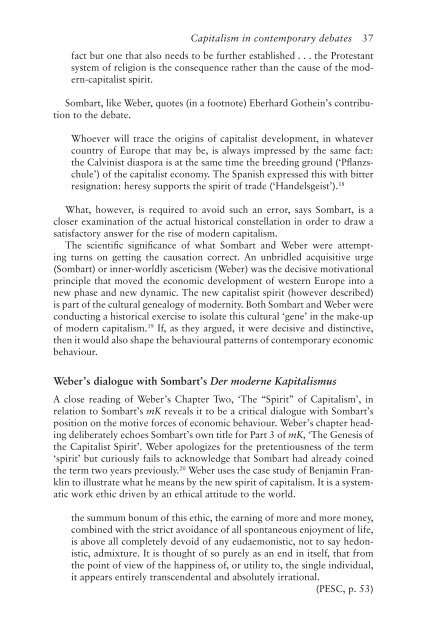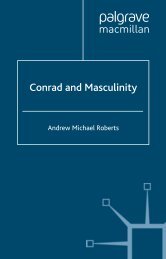- Page 2: Understanding Weber Understanding W
- Page 5 and 6: First published 2007 by Routledge 2
- Page 8 and 9: Contents List of figures viii Ackno
- Page 10 and 11: Acknowledgements As in the Essentia
- Page 12 and 13: Introduction In an article publishe
- Page 14 and 15: Introduction 3 view of the texts? M
- Page 16 and 17: Introduction 5 and deadline. At the
- Page 18 and 19: Introduction 7 scholarship; he used
- Page 20 and 21: Introduction 9 years counts as a lo
- Page 22 and 23: 1 Weber before Weberian sociology,
- Page 24 and 25: Weber before Weberian sociology, re
- Page 26 and 27: Weber before Weberian sociology, re
- Page 28 and 29: Weber before Weberian sociology, re
- Page 30 and 31: Weber before Weberian sociology, re
- Page 32 and 33: Weber before Weberian sociology, re
- Page 34 and 35: Weber before Weberian sociology, re
- Page 36 and 37: Weber before Weberian sociology, re
- Page 38 and 39: Weber before Weberian sociology, re
- Page 40 and 41: 2 Capitalism in contemporary debate
- Page 42 and 43: Capitalism in contemporary debates
- Page 44 and 45: Capitalism in contemporary debates
- Page 46 and 47: Capitalism in contemporary debates
- Page 50 and 51: Capitalism in contemporary debates
- Page 52 and 53: Simmel’s Philosophy of Money Capi
- Page 54 and 55: Capitalism in contemporary debates
- Page 56 and 57: Capitalism in contemporary debates
- Page 58 and 59: Capitalism in contemporary debates
- Page 60 and 61: The Protestant Ethic and the ‘Spi
- Page 62 and 63: The Protestant Ethic and the ‘Spi
- Page 64 and 65: The Protestant Ethic and the ‘Spi
- Page 66 and 67: The Protestant Ethic and the ‘Spi
- Page 68 and 69: The Protestant Ethic and the ‘Spi
- Page 70 and 71: The Protestant Ethic and the ‘Spi
- Page 72 and 73: The Protestant Ethic and the ‘Spi
- Page 74 and 75: The Protestant Ethic and the ‘Spi
- Page 76 and 77: The Protestant Ethic and the ‘Spi
- Page 78 and 79: The Protestant Ethic and the ‘Spi
- Page 80 and 81: The Protestant Ethic and the ‘Spi
- Page 82 and 83: The Protestant Ethic and the ‘Spi
- Page 84 and 85: 4 ‘Wissenschaftslehre’ Tying PE
- Page 86 and 87: ‘Wissenschaftslehre’ 75 The stu
- Page 88 and 89: ‘Wissenschaftslehre’ 77 of huma
- Page 90 and 91: ‘Wissenschaftslehre’ 79 inverte
- Page 92 and 93: ‘Wissenschaftslehre’ 81 This is
- Page 94 and 95: ‘Wissenschaftslehre’ 83 One wou
- Page 96 and 97: ‘Wissenschaftslehre’ 85 philolo
- Page 98 and 99:
‘Wissenschaftslehre’ 87 and cre
- Page 100 and 101:
‘Wissenschaftslehre’ 89 allow u
- Page 102 and 103:
‘Wissenschaftslehre’ 91 Comtean
- Page 104 and 105:
‘Wissenschaftslehre’ 93 that re
- Page 106 and 107:
‘Wissenschaftslehre’ 95 selecti
- Page 108 and 109:
‘Wissenschaftslehre’ 97 treatme
- Page 110 and 111:
‘Wissenschaftslehre’ 99 said as
- Page 112 and 113:
‘Wissenschaftslehre’ 101 So Web
- Page 114 and 115:
‘Wissenschaftslehre’ 103 the he
- Page 116 and 117:
‘Wissenschaftslehre’ 105 jectiv
- Page 118 and 119:
‘Wissenschaftslehre’ 107 Ricker
- Page 120 and 121:
‘Wissenschaftslehre’ 109 synchr
- Page 122 and 123:
‘Wissenschaftslehre’ 111 and ne
- Page 124 and 125:
‘Wissenschaftslehre’ 113 impact
- Page 126 and 127:
‘Wissenschaftslehre’ 115 (or an
- Page 128 and 129:
The reluctant sociologist 117 in a
- Page 130 and 131:
The reluctant sociologist 119 elsew
- Page 132 and 133:
The reluctant sociologist 121 takes
- Page 134 and 135:
The reluctant sociologist 123 contr
- Page 136 and 137:
The reluctant sociologist 125 was m
- Page 138 and 139:
The reluctant sociologist 127 Jürg
- Page 140 and 141:
The reluctant sociologist 129 tiqui
- Page 142 and 143:
The reluctant sociologist 131 footp
- Page 144 and 145:
The reluctant sociologist 133 for o
- Page 146 and 147:
The reluctant sociologist 135 histo
- Page 148 and 149:
The reluctant sociologist 137 The s
- Page 150 and 151:
The reluctant sociologist 139 the s
- Page 152 and 153:
The reluctant sociologist 141 Grund
- Page 154 and 155:
The reluctant sociologist 143 a Eco
- Page 156 and 157:
The reluctant sociologist 145 can b
- Page 158 and 159:
The reluctant sociologist 147 more
- Page 160 and 161:
The reluctant sociologist 149 Weber
- Page 162 and 163:
The reluctant sociologist 151 this
- Page 164 and 165:
The reluctant sociologist 153 asser
- Page 166 and 167:
The reluctant sociologist 155 an or
- Page 168 and 169:
Collected Essays in the Sociology o
- Page 170 and 171:
The Sociology of Religion 159 noted
- Page 172 and 173:
The Sociology of Religion 161 of th
- Page 174 and 175:
The Sociology of Religion 163 this
- Page 176 and 177:
The Sociology of Religion 165 Max W
- Page 178 and 179:
The Sociology of Religion 167 belie
- Page 180 and 181:
The Sociology of Religion 169 which
- Page 182 and 183:
The Sociology of Religion 171 evolu
- Page 184 and 185:
The Sociology of Religion 173 too,
- Page 186 and 187:
The Sociology of Religion 175 Weber
- Page 188 and 189:
The Sociology of Religion 177 inter
- Page 190 and 191:
The Sociology of Religion 179 Winde
- Page 192 and 193:
The Sociology of Religion 181 Weber
- Page 194 and 195:
The Sociology of Religion 183 human
- Page 196 and 197:
The Sociology of Religion 185 toget
- Page 198 and 199:
The Sociology of Religion 187 debat
- Page 200 and 201:
The Sociology of Religion 189 wants
- Page 202 and 203:
The Sociology of Religion 191 alway
- Page 204 and 205:
7 Going beyond Weber The last chapt
- Page 206 and 207:
Going beyond Weber 195 violence. Th
- Page 208 and 209:
Going beyond Weber 197 run from Lon
- Page 210 and 211:
Going beyond Weber 199 hand-written
- Page 212 and 213:
Going beyond Weber 201 practical gu
- Page 214 and 215:
Going beyond Weber 203 were not inc
- Page 216 and 217:
Going beyond Weber 205 the fundamen
- Page 218 and 219:
Going beyond Weber 207 movements. E
- Page 220 and 221:
Going beyond Weber 209 mundane life
- Page 222 and 223:
Going beyond Weber 211 concerning e
- Page 224 and 225:
Going beyond Weber 213 of life, and
- Page 226 and 227:
Going beyond Weber 215 1 The increa
- Page 228 and 229:
Going beyond Weber 217 and superior
- Page 230 and 231:
Going beyond Weber 219 Religious ra
- Page 232 and 233:
Power, legitimacy and democracy 221
- Page 234 and 235:
Power, legitimacy and democracy 223
- Page 236 and 237:
Power, legitimacy and democracy 225
- Page 238 and 239:
Power, legitimacy and democracy 227
- Page 240 and 241:
Power, legitimacy and democracy 229
- Page 242 and 243:
Power, legitimacy and democracy 231
- Page 244 and 245:
Power, legitimacy and democracy 233
- Page 246 and 247:
Power, legitimacy and democracy 235
- Page 248 and 249:
Power, legitimacy and democracy 237
- Page 250 and 251:
Power, legitimacy and democracy 239
- Page 252 and 253:
Power, legitimacy and democracy 241
- Page 254 and 255:
Power, legitimacy and democracy 243
- Page 256 and 257:
Power, legitimacy and democracy 245
- Page 258 and 259:
9 Sociological categories and the t
- Page 260 and 261:
Sociological categories and the typ
- Page 262 and 263:
Sociological categories and the typ
- Page 264 and 265:
Sociological categories and the typ
- Page 266 and 267:
Sociological categories and the typ
- Page 268 and 269:
Sociological categories and the typ
- Page 270 and 271:
Sociological categories and the typ
- Page 272 and 273:
Sociological categories and the typ
- Page 274 and 275:
Sociological categories and the typ
- Page 276 and 277:
Sociological categories and the typ
- Page 278 and 279:
Sociological categories and the typ
- Page 280 and 281:
Sociological categories and the typ
- Page 282 and 283:
Notes Introduction 1 Nelson, B.,
- Page 284 and 285:
Notes 273 21 Die Verhältnisse der
- Page 286 and 287:
Notes 275 6 Quoted by Lehmann, p. 5
- Page 288 and 289:
Notes 277 essence of mental activit
- Page 290 and 291:
Notes 279 31 Zaret, D., ‘The Use
- Page 292 and 293:
Notes 281 28 Wilhelm Dilthey. Selec
- Page 294 and 295:
Notes 283 71 We have seen this with
- Page 296 and 297:
Notes 285 Werk und Person, Meurer,
- Page 298 and 299:
Notes 287 6 Quoted in Fisher, H.A.L
- Page 300 and 301:
Notes 289 lications, 1994; also Das
- Page 302 and 303:
Index Agevall, Ola 273 agrarian que
- Page 304 and 305:
Hettner, A. 142 heuristics 111 Heus
- Page 306 and 307:
Schutz, Alfred 109 science 90-1, 10




